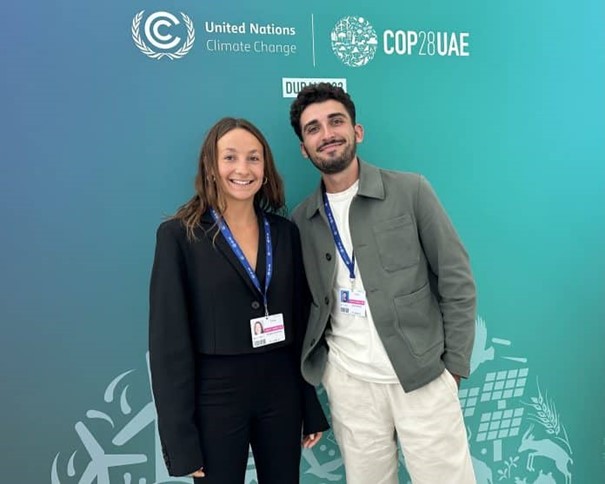When environmental advocate Johan, known as @lejeuneengagé, announced on his Instagram account that he was taking part in COP28 in Dubai, there were some strong reactions: “Someone who calls themselves eco-friendly but who takes the plane!” “A preacher doing a round-trip to Dubai”. However, Johan did not take a plane to get to the UN Climate Change Conference.
Johan Reboul, a former intern at UNRIC and author of the book “Guide du jeune engagé” (Young Activists’ Guide), left France at the end of September with fellow climate change advocate Victoria Guillomon, an author and speaker, for a six-month journey from Paris to Shimla in India. Their project: to make a documentary about the issue of water scarcity. Their challenge: to travel to India using the least polluting means of transport possible.
With two backpacks and a camera, these two 24-year-olds decided to meet those impacted by the effects of climate change on water, and those who innovate, find solutions, and fight to protect this resource.
“The issue of water raises many problems: rising sea levels, marine floods, salinisation of groundwater, impacts on agriculture, disappearance of forests, erosion, soil loss, climate migrations, etc.,” they write on their project’s website.
Their journey has already taken them through Türkiye, Egypt, and Saudi Arabia.
By train, boat, and hitchhiking to Dubai
Some 8,379 km separates Paris from Shimla. For the first part of their journey, they took trains, boats, hitchhiked, and walked some of the way.
“We have so many anecdotes to tell, each day feels like a week. We barely have time to digest what we’ve just experienced before we embark on another adventure. What we’ve lived through since the beginning is incredible. At first, we really tried to control what we wanted to do and how to do it, but once we let go, the magic of encounters really began,” comments Victoria during an interview with UNRIC.
They were still in Saudi Arabia when they decided it would be too much of a missed opportunity not to pass by COP28, in the United Arab Emirates, which was now so close.
A few emails and phone calls later, they managed to gain a spot as part of the French delegation. All that was left was to stand by the road, thumb a ride, and wait for a vehicle to take them. Not easy and even a bit perilous, as hitchhiking is forbidden in the United Arab Emirates. Crossing the border on foot is also prohibited.
From frugality to excess
For a climate influencer and an environmental activist, Dubai was a shock. “The shopping centres are so cold that polar bears could live there,” Johan joked in one of his videos.
“We’ve been on the road for two months trying to talk about frugality. Arriving here, this excess, water flowing freely in one of the most desert regions of the world… it’s a bit scary,” says Johan.
“It was my first time attending a COP, and this one was special with 80,000 people expected in a country where excess is total. It’s a COP of many paradoxes,” he continues. “There were several different profiles. We were able to exchange with many extraordinary people who are making a difference, and at the same time, we noticed the significant number of representatives from the oil industries.”
“Everything seems a bit fake here, like a parallel world. Dubai is the opposite of everything we advocate and defend,” comments Victoria.
She left with mixed feelings: “I left with a feeling of powerlessness. There, everything and its opposite is said, there are diverging interests. But it’s very important that everyone comes together and that conferences like the COP exist, even if they could be more effective.”
Setting their sights on India, still without a plane
Having started with a limited budget, supported by a few sponsors and a fundraising campaign, they often sleep in the homes of locals, share meals with Bedouins they meet along the way, and in the United Arab Emirates, enjoyed the hospitality of glaciologist Heidi Sevestre, who shared her hotel room with the young adventurers.
On 5th December, they left COP28 to continue their journey, heading to Oman. Their route is not entirely defined and changes dependent on encounters and opportunities.
In a few weeks, they should arrive at their final destination, Shimla, the capital of Himachal Pradesh, in the foothills of the Himalayas. Here, climate change and land use changes have led to extreme temperature rises and irregular precipitation, affecting the city’s water access.
Their project has attracted the attention of the UN’s culture agency, UNESCO, and they have been included in its “Green Citizen” project. They created an Instagram account, @shimla_film, dedicated to their journey, allowing followers to keep up with their daily life until their documentary is available to view.
See also:




